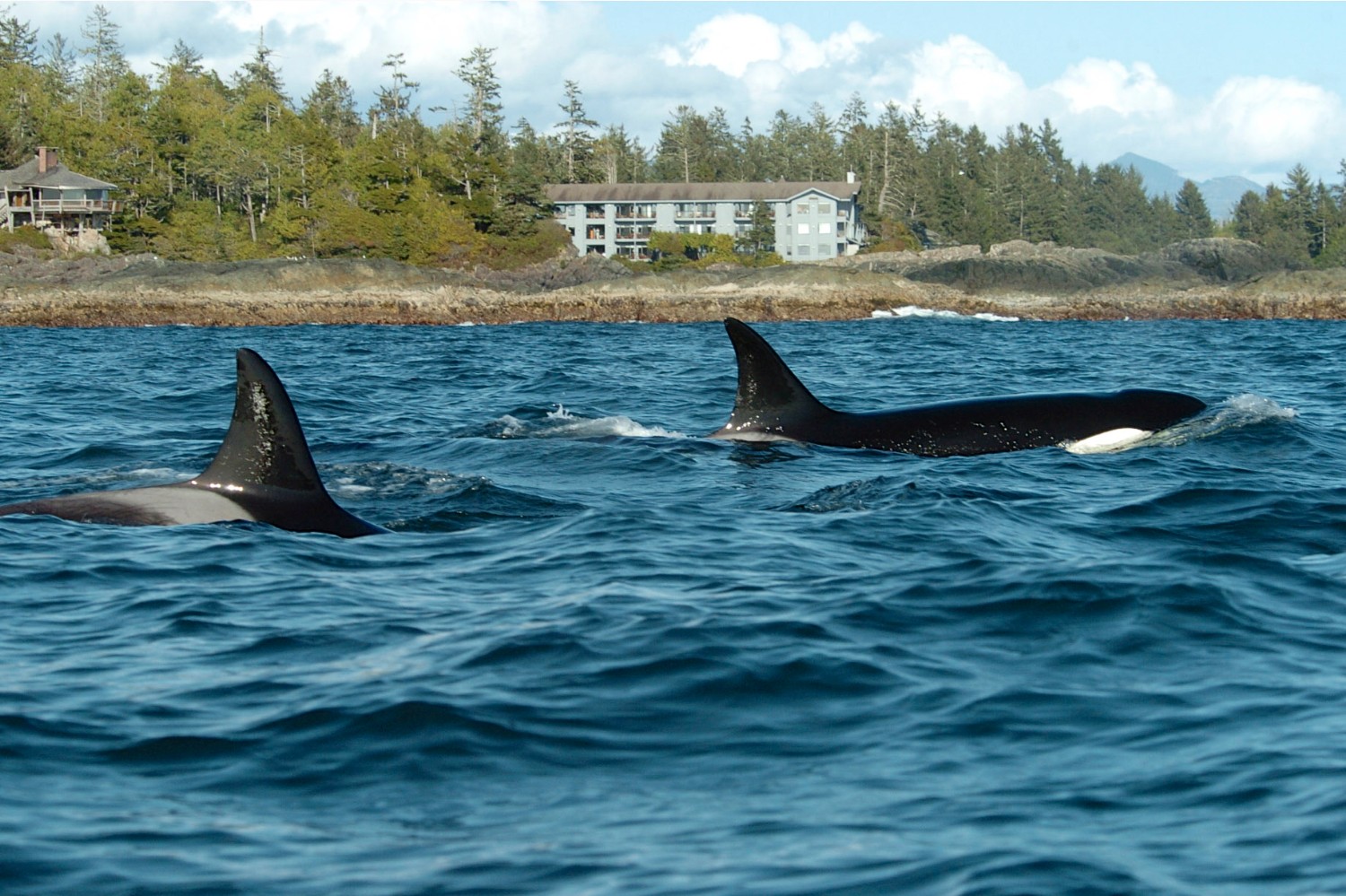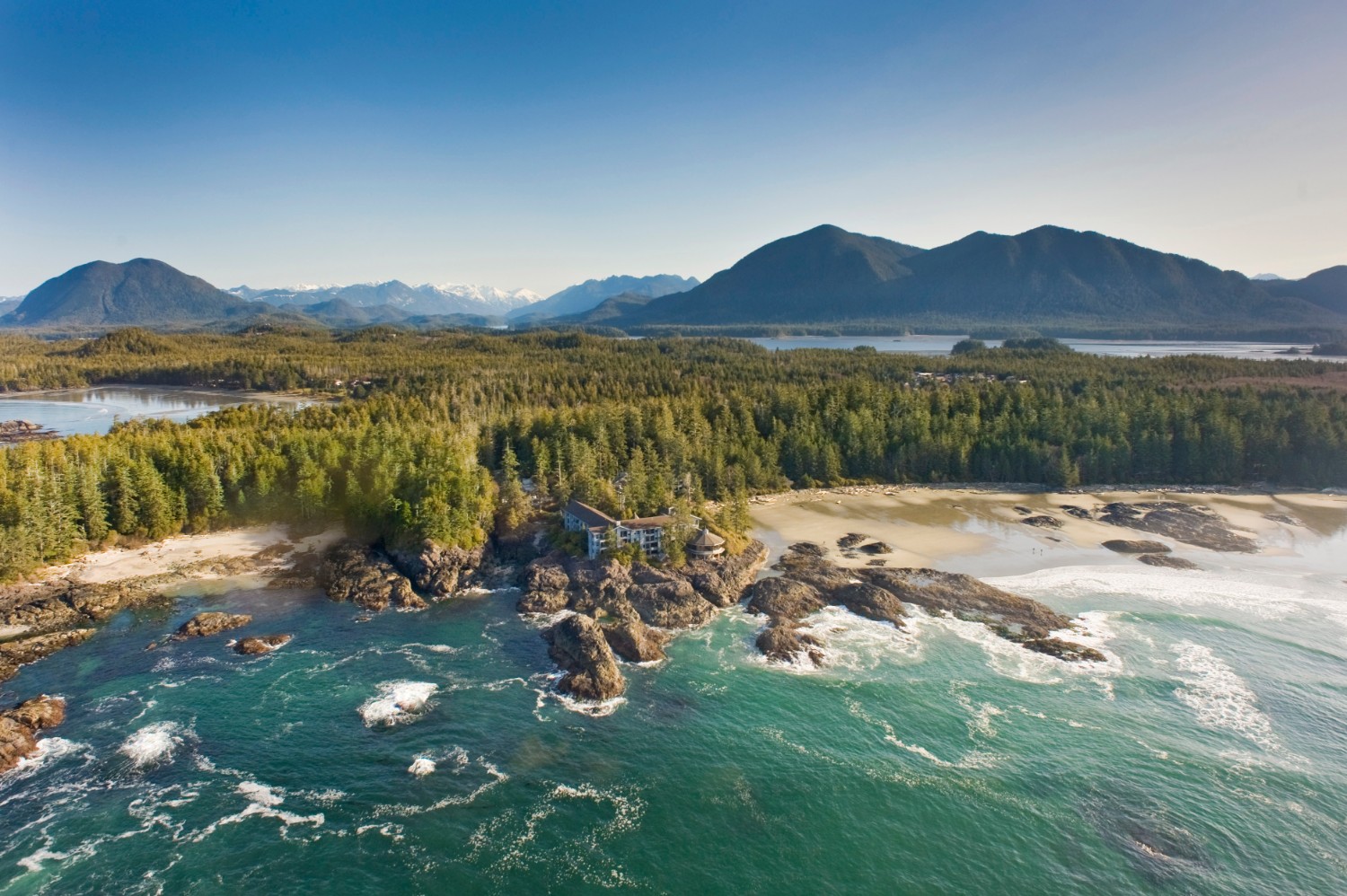These British Columbia Properties Put an Emphasis on Conservation
Original Article by Tarajia Morrell for Departures
For more and more of us, luxury is no longer only synonymous with opulence. As the realities of climate change and pollution become impossible to ignore, we expect the luxury travel sector to pamper us while maintaining environmental responsibility, often no easy feat, but one that is essential. Nowhere is this coda more crucial or evident than in remote retreats where access to nature is central to the experience of extravagance and gratification of one’s journey. For World Ocean Day 2019, and on the heels of the harrowing U.N. report on unprecedented species extinction rates, I traveled to the west coast of Vancouver Island in British Columbia, to see how two Relais & Chateaux properties—Clayoquot Wilderness Resort and the Wickaninnish Inn—were incorporating ocean health and environmentalism into their hospitality ethos and programming.
For ten years, Relais & Chateaux, the global association of individually owned and operated luxury properties, has united its members with a campaign to rethink their practices around seafood sourcing and environmental sustainability, and World Oceans Day 2019 marked their introduction of Fish Unknown, a campaign to heighten the public’s awareness of abundant but underutilized varieties to help protect the waning numbers of endangered and threatened species.
From Vancouver, we boarded an eight-person seaplane to fly over the Strait of Georgia and across Vancouver Island toward Tofino and Clayoquot Sound, and civilization tapered quickly behind us in favor of forests interspersed with alpine lakes. The air proved an apt way to arrive as it offered a bird’s eye view into two of the areas most environmentally controversial practices, both manmade, of course: the patchwork of bald mountains from the insatiable logging industry and the strange buoyed pens where salmon farms are installed in the otherwise pristine sound waters.
Arriving at the exquisitely appointed Clayoquot Wilderness Resort, which is modeled after gilded era great camps and lies in one of the planet’s last remaining temperate rainforests, a UNESCO biosphere reserve, the brilliance of the surrounding mountains and sheen from the water at its doorstep was so lustrous that it was easy to forget we had a care in the world or necessary concerns over wildlife health. Nestled beneath snow-capped peaks, in a verdant valley where the Bedwell River—salmon spawning mecca for thousands of years—meets the Clayoquot Sound—and accessible only via boat, helicopter, or seaplane, we were scooped from the private dock by horse-drawn carriages and shuttled to a majestic main lodge. A bevy of grinning guides (and their pack of playful dogs) greeted us, offered us brut British Columbian sparkling wine and schooled us never to tote snacks to our tents lest they become lures for the healthy local black bear population. Then they escorted us past a circle of social tents—for dining, a game of pool or backgammon, an impromptu piano serenade—to our lush prospector-style private guest tents.
It’s a dizzying and delicious combination to be suddenly immersed in natural beauty so brisk, ancient and alpine-fragrant, but also privy to creature comforts like a heated tent floor, antiques recalling the rural ranch elegance in Legends of the Fall, and a thermostat-controlled cast iron stove shedding warm light on my elegant new digs. Furthering the sense of plenty, Clayoquot’s restaurant with Canadian Chef Michael Pataran at its helm and a menu using local produce with Asian flair from his years cooking in Cambodia, was ample and varied, except for one thing: salmon was notably not on offer, a surprise at a resort at the epicenter of the keystone species’ life cycle.
Over dinner including locally foraged alpine mushrooms, pine-smoked and served with roast apple and house-made moromi miso, I spoke with Bradley Goian and Antonella Puglisi who together run Clayoquot to discuss the decision to omit salmon, both from their menu and from their sport fishing programming. "We are confronted with the depleted salmon populations right here in our own backyard on the Bedwell River. It wouldn't be a responsible or sustainable decision for us to continue serving it,” Goian said. Indeed, though salmon was once the area’s focal fishing industry, the wild Chinook and Chum salmon stocks are so low that there’s barely a wild salmon fishing industry left there.

Guided by Doug Palfrey who runs the non-profit Tofino Salmon Enhancement Society, Clayoquot’s Wilderness Resort invests heavily in fostering the salmon populations that spawn in the Bedwell River, on which the resort rests. Logs and rocks have been anchored in a Bedwell side channel to create an ideal environment for Chinooks to spawn. Meanwhile, Palfrey captures brood stock, incubates the fertilized eggs, hatches them, grows the fry and releases them carefully in the wild where they’ll have the best possible chance to survive. This includes manually tagging about 41,500 Chinook fry in the Bedwell last year (200,000 total) in order to track their journeys. “We adipose clip the Chinook and insert a coded wire tag,” explains Palfrey. “This gives catch information from Alaska to their natal streams here. The tagged heads are turned in by the commercial, sports and native user groups.” In other words, every fish they help can be accounted for. Given Palfrey and his cohorts’ work on behalf of the salmon, the Clayoquot Wilderness Reserve feels a duty to protect — not serve or fish — these hardwon survivors. “We’ve had no complaints or pushback,” Puglisi added about the decision, which, along with the informed guides, draws attention to the problem and simultaneously helps to educate guests about it. “We wanted to plant a flag,” she says.
The next day, within ten minutes of leaving the resort by boat, we spotted a female black bear foraging for crabs at the shoreline under low tide-exposed rocks. My delight at watching her breakfast distracted me from the two fur ball cubs relegated to a cedar tree top to wait for her. In addition to our group watching from the water, two bald eagles (they are prolific in these parts) also observed the bears’ morning routine. As we made our way toward the mouth of the sound, we encountered playful sea otters, lazing sea lions, mammoth grey whales surfacing to breathe, harbor seals and much, much more. The biodiversity here is astounding, so every trace of human presence is glaring, particularly the salmon aquaculture farms, which notoriously leak hormones and diseases, including sea lice, to wild fish, some of which have been found within the floating pens. Fish farms that had moved on to new locations left buoys lazily piled at the water’s edge or simply half disassembled floating on the otherwise unspoiled surface.
On the other hand, the farms provide much needed jobs to indigenous First Nations people, and Palfrey, who closely monitors the salmon numbers and rivers from which they’ve traditionally run, says there’s no future in which we’ll all be able to eat wild salmon and that “farming local stock organically is a huge step forward,” he says, alluding to one local aquaculture farm called Creative Salmon, which has organic certification, omits growth hormones and genetically modified organisms and hence has a much lower yield but a far lesser impact on the environment. Cermaq, another global salmon aquaculture enterprise with a farm in the area, doesn’t have organic certification and has recently requested permission to use an anti-lice drug called Lufenuron which is powerful but toxic, making fish inedible for 350 days, which sounds both dangerous and unappealing to say the least.
After three glorious days learning about the flora and fauna surrounding Clayoquot, we headed to the surf town of Tofino, to the Wickaninnish Inn, which sits gracefully on the coast with Chesterman beach unfurling beneath it like a great silver ribbon. Charles McDiarmid, the Wickaninnish’s proprietor, lovingly told us about his unique bond with this beach and this town. As a young man, Charles’ dad, Dr. Howard McDiarmid, moved to Tofino to run the sleepy town’s local hospital and fell in love with quirky community on the cusp of wilderness and ocean, so much so that, in 1971, Dr. McDiarmid was instrumental in the creation of Pacific Rim National Park Reserve. In 1996, when Charles approached his father and convinced him that their land was the perfect place for the charming town’s best hotel and restaurant, the Wickaninnish Inn was born, formidable and elegant, rustic yet graceful...and conceived of by Charles with Relais & Chateaux in mind.

The owners’ deep connection to the Wick’s locale is obvious in every detail. Beams in the Pointe Restaurant — which has 260-degree views onto the broad beach, nearby islands and the Pacific Ocean — and the walls of the beach-building lobby came from the Western Red Cedars and Sitka Spruces that were cleared to build the inn and its grounds. Furniture in the rooms was handmade from reclaimed wood. The inn has raised and donated $62,000 to Surfrider Pacific Rim Foundation, to help protect British Columbia’s beaches and marine life. The Wick stylishly curtails the use of plastic bottles on the premises by offering guests metal thermoses in each room and taps with sparkling for flat water in the lobbies, and echoing the restaurant’s leadership, Tofino’s mayor, Josie Osborne, banned plastic bags and plastic straws townwide.
At the helm of the Wick’s Pointe Restaurant, young superstar-chef-in-the-making, Carmen Ingham, offers an astoundingly sophisticated menu for such a small town (just 2000 year-round inhabitants) using pristine local ingredients. Ingham works with local fishermen, foragers and even farmers on Vancouver Island, serving up creative concoctions, some of which may be unfamiliar to guests. “The ocean offers so many amazing ingredients, very few of which we have become accustomed to recognizing in the grocery store and on restaurant menus,” Ingham says with Relais & Chateaux’s Fish Unknown campaign in mind. True to his word, he served us an exquisite gooseneck barnacle and gorse flower risotto with dashi velouté and samphire. Gooseneck barnacles, known also as percebesin Spain and Portugal where they are a delicacy (and are over-harvested) look prehistoric and inedible, but taste delicate and lusciously of the sea. It’s inevitable that anyone lucky enough to taste his dish will leave loving the intertidal crustaceans, which are highly sustainable in the Americas. “If we as a society can embrace seafood that is now ‘unknown,’ the seafood that we do know well, will have a chance to remain so for the future.” Ingham continues. “The skill of a chef today is not only measured by how delicious and beautiful their food is, but also its impact on future generations.”
See All Blog Posts